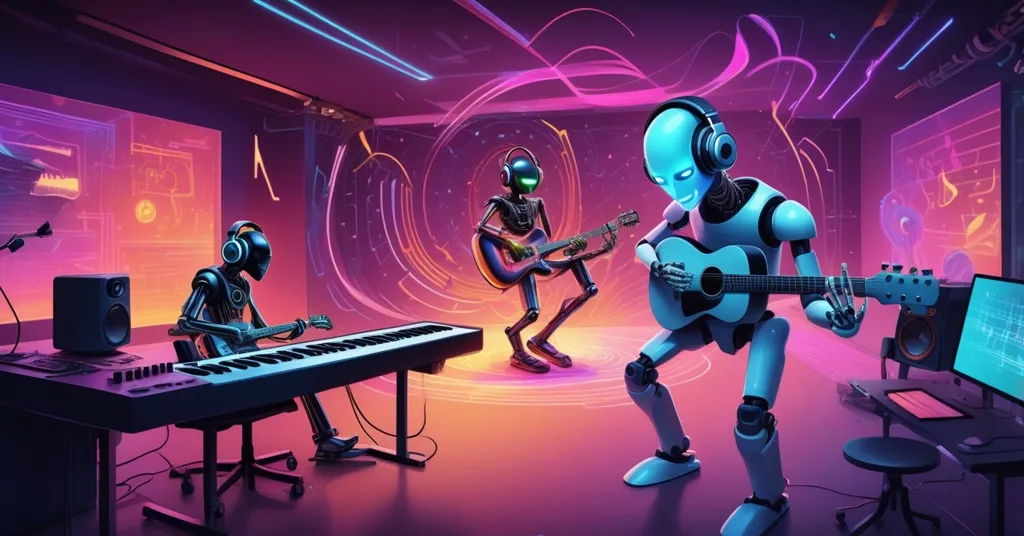Warner Music Settles with Udio, Suno Hits $2.45B Valuation in AI Music Boom

AI Music Ignites: Warner Music Settles with Udio, Suno Surges to $2.45B Valuation
Can artificial intelligence craft the next global hit, or will it bury human creativity under a flood of synthetic sound? Two monumental developments—Warner Music Group’s landmark settlement with AI music startup Udio and Suno’s staggering $2.45 billion valuation—prove this debate is no longer a futuristic thought experiment, but a present-day showdown.
- Warner-Udio Partnership: Warner Music resolves copyright clash with Udio, sets stage for 2026 AI music platform.
- Suno’s Meteoric Rise: Suno secures $250M in funding, reaches $2.45B valuation despite legal battles.
- Industry Tension: From lawsuits to licensing, AI music technology reshapes the game—but at what cost to artists?
Warner Music and Udio: A New Frontier for AI Music Copyright
Warner Music Group, a heavyweight in the recording world, has just struck a deal with Udio, a Massachusetts-based AI music company, marking a pivotal shift in the contentious relationship between traditional labels and generative AI startups. This settlement, following Universal Music Group’s similar resolution with Udio in October 2024, makes Warner the second of the “big three” labels to move from litigation to collaboration. The original dispute centered on claims that Udio trained its AI models on copyrighted music without permission, a practice major labels argued could “cheapen” and “drown out” human artistry by mass-producing derivative tracks at an unprecedented scale.
Instead of prolonging a courtroom slugfest, Warner and Udio are now teaming up for a subscription-based platform slated for launch in 2026. This service will allow users to create AI-generated remixes, covers, and original songs using Warner’s extensive licensed catalog. A critical component of this deal is the opt-in system for artists, ensuring they receive both credit and compensation when their work fuels AI creations. Warner’s CEO, Robert Kyncl, underscored this priority with a firm stance.
“We’re unwaveringly committed to the protection of the rights of our artists and songwriters, and Udio has taken meaningful steps to ensure that the music on its service will be authorized and licensed.”
This isn’t mere corporate rhetoric—it echoes lessons from past tech disruptions like Napster, which once upended the industry by enabling free music sharing, forcing labels to adapt or perish. With AI music technology, Warner seems to be choosing adaptation over resistance, setting up guardrails to harness innovation responsibly. Beyond Udio, Warner also partnered with Stability AI in November 2024 to develop ethically trained AI tools for music creation, a move paralleled by Universal Music Group’s own Stability AI deal in October. These collaborations signal a growing focus on responsible data sourcing to sidestep the copyright minefield that has plagued AI startups.
Suno’s $2.45B Valuation: Boom Amidst Legal Firestorm
While Warner charts a path of cooperation, Suno is riding a wildly different wave—one fueled by massive investment despite lingering legal scrutiny. The AI music platform, which lets users generate songs from text prompts, ranging from amateurs to professional creators, has raised $250 million in a funding round led by Menlo Ventures. Other big names, including Nvidia’s NVentures, Lightspeed, Hallwood Media, and Matrix, joined in, catapulting Suno’s valuation to an eye-popping $2.45 billion. That’s a figure typically reserved for established tech giants, not a startup still grappling with lawsuits from Warner, Universal, and Sony Music over copyright infringement allegations. For more on this development, check out the detailed report on Suno’s valuation surge and Warner’s settlement with Udio.
Suno’s CEO, Mikey Shulman, emphasized that this capital will drive the development of more advanced generative audio tools and expand the platform’s global reach, tapping into the accelerating demand for AI-driven creativity. With millions of users over the past two years, Suno has proven that accessible music creation isn’t a niche gimmick—it’s a cultural force. But here’s the hard truth: legal battles loom large. Unlike Udio, Suno hasn’t settled with any major labels, facing accusations that its AI was trained on protected recordings without authorization. Sony Music, notably, remains the only major label still litigating against Udio as well, holding a tougher line than its peers. These unresolved disputes spotlight a core dilemma in AI music technology: can innovation outpace the legal frameworks meant to protect traditional creators?
Unpacking Generative AI: Promise and Peril
For those unfamiliar with the tech behind this storm, let’s break it down. Generative AI in music refers to algorithms that produce new audio based on patterns learned from existing songs. Imagine an AI as a digital composer that’s “studied” thousands of tracks and can create something fresh from a prompt like “make a jazz tune with a modern twist.” The hitch lies in the training data—the library of music the AI learns from. If it includes copyrighted songs without licensing, it’s like a chef using someone else’s recipe book without credit or payment. In music history, sampling without clearance has sparked lawsuits, especially in hip-hop. AI takes this issue to another level, generating endless variations that could flood platforms with content, potentially overshadowing human artists.
On the flip side, the democratization of creativity is hard to ignore. Suno’s platform lets anyone with an idea produce a song without a studio or musical training, while Warner’s upcoming service with Udio could enable fans to remix favorite tracks legally. This opens up new avenues for engagement and innovation. Yet, the risk of oversaturation looms—if every social media user can crank out a decent track in minutes, does professional artistry lose its value? And let’s not sugarcoat it: some AI startups have blatantly dodged ethical standards in their race to market, a move that’s justifiably infuriated artists and labels alike. Are settlements like Warner’s with Udio genuine steps forward, or just PR maneuvers to mask deeper exploitation?
Historical Echoes: From Napster to AI
The music industry has been here before, wrestling with tech that reshapes how we create and consume sound. In the late 1990s, Napster’s peer-to-peer file sharing let users download music for free, gutting label revenues and forcing a reckoning that birthed legal streaming models like Spotify. Even Spotify’s royalty system, though, remains a sore point for many artists who earn pennies per play. AI music technology could exacerbate these inequities if not handled with care—imagine streams dominated by AI-generated tracks, further squeezing human creators. Earlier battles over sampling in the 1980s and 1990s also set precedents; artists like Biz Markie faced lawsuits for uncleared samples, leading to stricter licensing norms. AI poses a unique challenge, though, as it doesn’t just borrow snippets—it synthesizes entire works, testing the boundaries of fair use, a legal principle allowing limited use of copyrighted material without permission, like quoting a book in a review. Courts have yet to fully define fair use for AI training data, leaving a gray area that could spark years of litigation.
Artist Voices and Ethical Dilemmas
Amid the corporate deals and investor hype, the perspective of artists themselves feels conspicuously absent. Many independent musicians and smaller labels view AI with a mix of intrigue and dread. On one hand, tools like Suno could amplify their reach, letting them experiment without big budgets. On the other, there’s a visceral fear of being outcompeted by algorithms that churn out content faster than any human could. Is it fair for AI to profit off decades of human creativity without explicit consent, even if settlements promise compensation? This moral gray area demands more than just legal fixes—it calls for a cultural conversation about the soul of music. Partnerships with Stability AI aim to tackle these ethical concerns by prioritizing responsibly trained models, but skepticism remains. Will these efforts truly protect artists, or are they window dressing for an industry racing to cash in?
Future Scenarios: Disruption or Harmony?
Looking ahead, the trajectory of AI music technology hinges on how stakeholders balance innovation with fairness. One possibility is stricter regulation—governments could mandate transparency on AI training data, forcing startups to license every note or face crippling fines. Another scenario sees artist-led pushback, with boycotts or advocacy for platforms that prioritize human work. There’s also a potential tie to decentralized tech, a topic close to our core audience. Could blockchain-based royalty systems ensure transparent compensation for artists whose music feeds AI models? Imagine smart contracts automatically distributing earnings every time an AI track borrows from a copyrighted source—a solution that aligns with the ethos of decentralization and fairness we champion. Conversely, if AI music dominates streaming platforms unchecked, we risk a homogenized soundscape where algorithms dictate trends, leaving little room for the raw, unpredictable brilliance of human expression.
Investors, meanwhile, are placing huge bets on AI’s transformative power. Nvidia’s NVentures backing Suno isn’t just a financial play—it’s a sign that generative audio could become a cornerstone of tech and entertainment. Yet, with valuations like $2.45 billion, are we inflating a bubble? If legal rulings swing against Suno, that figure could crumble faster than a poorly mixed track. The shift from lawsuits to licensing, as seen with Warner and Udio, offers a pragmatic roadmap, but Sony’s hardline stance reminds us not everyone’s ready to compromise. The beat of AI music technology marches on, and whether it uplifts or undermines the industry depends on choices made now.
Key Questions and Takeaways on AI Music Technology
- What does Warner Music’s settlement with Udio mean for AI’s role in music?
It signals a shift to licensed, controlled AI platforms, potentially reducing conflict while ensuring artists gain from tech innovation. - Why is Suno’s $2.45 billion valuation significant despite legal challenges?
It reflects investor faith in AI music’s explosive growth, viewing lawsuits as hurdles rather than dealbreakers. - How do partnerships with Stability AI address ethical issues in music creation?
They focus on responsibly trained models to avoid copyright violations, aiming to balance innovation with artist rights. - What legal obstacles still threaten AI music startups like Suno and Udio?
Unresolved fair use questions and training data legality could trigger more lawsuits or strict regulations, hampering progress. - Can AI music platforms disrupt traditional artists for better or worse?
They democratize creativity for all, but risk oversaturating markets with AI content, possibly devaluing human-made music. - How might artists protect their work from AI misuse?
Advocating for opt-in systems, blockchain royalties, and transparent licensing could safeguard their rights against exploitation.

